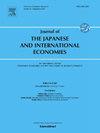The effects of the calculation class in elementary school on student outcomes
IF 3.1
3区 经济学
Q1 ECONOMICS
Journal of the Japanese and International Economies
Pub Date : 2025-03-01
DOI:10.1016/j.jjie.2025.101360
引用次数: 0
Abstract
We examine the impact of introducing a calculation class on the academic outcomes of elementary school students. The calculation class is characterized by instruction using an abacus (soroban in Japanese), a traditional calculation tool in Asia, and teaching by abacus instructors. The calculation class was introduced with time lags across schools and birth cohorts, which allows us to exploit the difference-in-differences strategy. Using administrative data from Amagasaki City in Japan, we find that the calculation class increases mathematics and Japanese scores by 0.145 and 0.0874 standard deviations, respectively. To explore possible mechanisms, we investigate the impact of the calculation class on students’ non-cognitive skills, academic behaviors at home, and the classroom environment. The results indicate that the calculation class improves non-cognitive skills, such as grit and motivation for studying. Furthermore, we find heterogeneous effects across gender, socioeconomic status (SES), and previous academic scores. Our estimation results show that the calculation class has a larger impact on the mathematics scores of female students, students from low-SES families, and previously low-performing students. Finally, we explore the long-term effects and find that, for female students, the impact tends to persist for one year after the class ends, but after that, the effects fade out.
小学计算课对学生学习成绩的影响
我们研究了引入计算课对小学生学业成绩的影响。计算课的特点是使用亚洲传统的计算工具算盘(日语为soroban)进行教学,并由算盘讲师进行教学。计算课引入了不同学校和出生队列的时间滞后,这使我们能够利用差异中的差异策略。利用日本长崎市的行政数据,我们发现计算班将数学和日语成绩分别提高了0.145和0.0874个标准差。为了探索可能的机制,我们调查了计算课对学生非认知技能、在家学习行为和课堂环境的影响。结果表明,计算课提高了非认知技能,如毅力和学习动机。此外,我们发现性别、社会经济地位(SES)和以前的学业成绩之间存在异质性影响。我们的估计结果显示,计算班对女学生、低经济地位家庭学生和以前表现不佳的学生的数学成绩有较大的影响。最后,我们对长期影响进行了研究,发现对于女学生来说,这种影响在课程结束后的一年内仍然存在,但在一年后,这种影响就会逐渐消失。
本文章由计算机程序翻译,如有差异,请以英文原文为准。
求助全文
约1分钟内获得全文
求助全文
来源期刊
CiteScore
5.10
自引率
6.90%
发文量
36
期刊介绍:
The Journal of the Japanese and International Economies publishes original reports of research devoted to academic analyses of the Japanese economy and its interdependence on other national economies. The Journal also features articles that present related theoretical, empirical, and comparative analyses with their policy implications. Book reviews are also published.

 求助内容:
求助内容: 应助结果提醒方式:
应助结果提醒方式:


